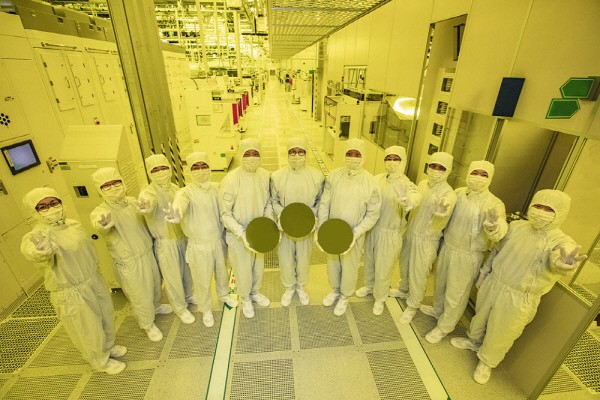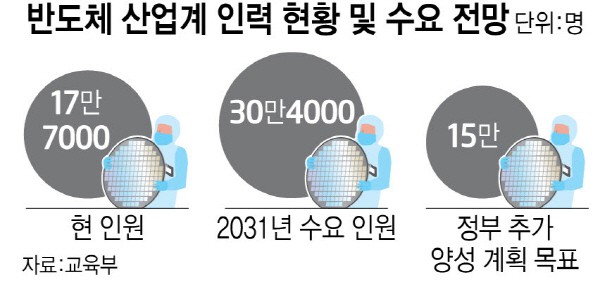Participation in industry and university related 'mega cooperation system'
Establishment of a 'Support Cooperation Center' with the Ministry of Education
Make use of retired engineers and speciali
Samsung Electronics is setting out to nurture 'on-site' semiconductor talent. It is launching an all-out war to secure high-quality professional manpower to solve the chronic semiconductor manpower shortage. A 'mega-cooperation system' that involves industry, academia, research, and government was presented as a method to overcome the limitations of human resource training.

On the 6th, Samsung Electronics signed a business agreement with the Ministry of Education for the 'Semiconductor Talent Training Support Cooperation Center' in which the government, education, industry, and research circles will participate. As part of the agreement, Samsung Electronics will participate in the 'mega cooperation system' to not only recruit its own semiconductor manpower but also support the manpower training ecosystem in all directions. Samsung Electronics has promoted industry-university cooperation, worth more than 100 billion won, annually since 2018. This business cooperation is expected to establish an expanded ecosystem strategy to meet the government's semiconductor manpower training policy.
Samsung Electronics plans to focus on fostering high-quality human resources tailored to the field, which is urgently needed in the semiconductor industry. According to the business agreement, the industry will cooperate in △ securing on-site specialized professors, △ supporting idle and used equipment, and △ field training and curriculum development. Securing on-site specialized professors is being seen as a strategy to overcome the lack of teachers despite the semiconductor curriculum being expanded. Since Samsung Electronics has secured world-class semiconductor field experts, an on-site education system is expected to be established using them. The industry is also suggesting a plan to hire Samsung Electronics' retired engineers as professional professors.
This will also actively solve the problem of old educational facilities that the academic community pointed out. Samsung Electronics is equipped with state-of-the-art facilities to mass produce semiconductors. Using Samsung Electronics' idle semiconductor process equipment or used equipment is expected to improve the infrastructure of educational facilities and create a practice environment that is close to being in the actual field.
Samsung Electronics expects this mega cooperation system will create synergy with the company's unique strategy for training and securing talent. Samsung Electronics is focusing its efforts on training semiconductor specialists by operating contract departments and various talent training programs. This is to overcome the manpower shortage for leading the semiconductor industry, because the semiconductor market is growing, but the number of human resources in science and engineering is continuously decreasing. Since cooperating with Sungkyunkwan University in 2006 to operate the semiconductor contract department, it has been expanding the contract departments with Yonsei University, KAIST, and POSTECH.

Samsung Electronics' DS division has been discovering overseas semiconductor talent through the annual 'Tech & Career Forum' since 2016. This year, it plans on securing more talent by expanding its base to domestic careers and new hires. Earlier this year, Samsung Electronics DS division CEO Kye-hyun Kyung gave a keynote speech at the forum, emphasizing the spirit of challenge and the creativity of talented people to lead the future of the semiconductor industry.
'Samsung Shining Star', which provides field trips to Samsung Electronics' semiconductor campus as well as theoretical and experiential education programs for first- and second-year college students in science, engineering and natural sciences, is also a foundation for fostering talent.
An official at Samsung Electronics said, “It is difficult for companies to secure future growth engines and technological competitiveness due to the worsening shortage of experts in each field of the semiconductor industry, which already has a high technological entry barrier,” adding, “In order for the semiconductor manpower policy to be successful, a mutual cooperation system is needed in which industry, academia, research, and government work together like the semiconductor industry training strategy.”
15 institutions participated in the business agreement that day including, the Ministry of Education, the Ministry of Trade, Industry and Energy, the Ministry of Science and ICT, the National Council of Governors of Education, the Korean Council for University Education, the Korean Council for University College Education, Samsung Electronics, SK Hynix, Nepes, Alpha Solutions, Korea Semiconductor Industry Association, Korea Infrastructure Organization for Nanotechnology, the Institute of Electronics and Information Engineers, the Institute of Semiconductor Engineers, and the Korea Institute for Advancement of Technology.

By staff reporter Dong-joon Kwon (djkwon@etnews.com)